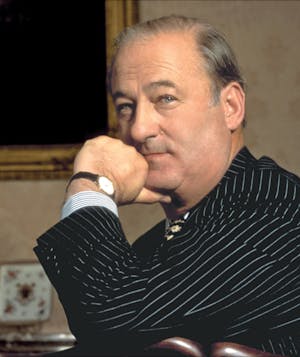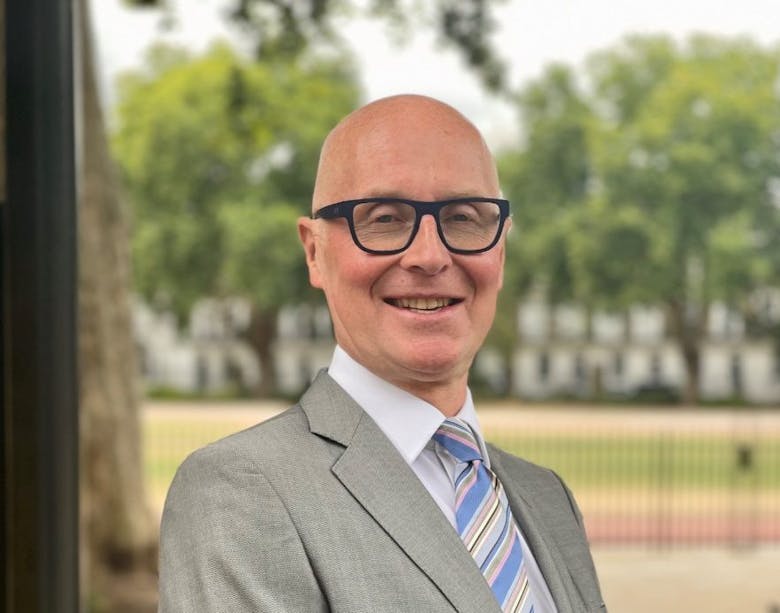PCL landlord Cadogan has announced the death of Lord Cadogan at the age of 86.

The venerable estate, which controls 93 acres around Sloane Square and the King’s Road, said Charles Gerald John, 8th Earl Cadogan KBE DL passed away peacefully at home in Chelsea yesterday.
“He will be fondly remembered by all who knew him,” added the statement, describing how he “cared intensely for Chelsea” and had “passed on a business that is in much better fettle than when he inherited it and set on a clear and confident course for the future”.
He is succeeded by his son Edward who becomes the 9th Earl Cadogan.
Remembering The Life of the Earl Cadogan (1937-2023)
via Cadogan
Lord Cadogan led a full life. He found enjoyment and amusement readily and was wonderful company, gregarious and voluble. He described himself as a ‘countryman’ and whilst his family business has been very successful under his stewardship, he felt most comfortable in the role of philanthropist.
His father went to fight in the Second World War initially in North Africa and his mother, the sister-in-law of the Aga Khan, followed. Charles went to school at Ludgrove aged 8, followed by Eton. It was Eton that made a great impression on him and he spoke often of his time there and most particularly of his sporting triumphs – with his imposing physique and a keen eye, he was an extremely able sportsman. The official account of Chelsea – as he was then known – winning the public schools rackets double championship against Winchester on 9 April 1955, makes exciting reading.
His father had returned from the war with a form of post traumatic shock and sought out the peace and quiet of Scotland, settling his family at Snaigow in Perthshire. Here, Charles was brought up with his three sisters Sarah, Daphne and Caroline, and developed a lifelong love of the natural environment. He recalled being sent out to catch a brace of trout or shoot a rabbit for tea and so learnt to shoot and fish by necessity and to understand the patterns and cycles of country life.
His enthusiasm for country sports provided him with enjoyment all his life. He combined this passion with house parties, fresh air and fun, as he would say, at which he and Lady Cadogan would be the most generous hosts. Latterly, once he stopped participating, he would sit on a shooting stick in front of the line of guns, and pass comment on the quality of shooting – “leg before wicket, another one of those and you are out” he would bellow to howls of laughter from him and all those within ear shot.
National Service followed school. He was a second lieutenant in the First Battalion of the Coldstream Guards serving in Germany. It is hard to imagine that he easily followed orders and so it was no surprise that he left the Army having completed his service and went into the City where he worked for Schroders for 16 years.
The experience he acquired at Schroders – where for some time he was responsible for personnel matters – provided him with a grounding he would draw on when leading the Estate, as well as helping him collect many friends and contacts who he could count on when needed.
He left Schroders and joined the family business, the Cadogan Estate, in 1974. Following the retirement of his father in 1979, he had the foresight and determination to commence a reorganisation of the Estate so that it could take a more active and creative approach to managing the area. He changed the business from being a traditional collector of ground rents from long leaseholders, to providing the foundations that allowed them to become masters of their own destiny, carefully curating the mixture of occupiers of the shops and restaurants and initiating improvements in managing the whole Estate in a cohesive way for the long-term. Under his leadership, the business bought Harvey Nichols so as to gain control of this anchor at the northern end of Sloane Street. With his encouragement, the barracks on the King’s Road was acquired and developed, creating the celebrated Duke of York Square which now provides a focal point for Chelsea. He had the ambition to create Cadogan Hall – a new classical concert hall – which was converted from a defunct church. He spoke of the “absolute lunacy” of buying and refurbishing this Listed Building, but never regretted it. Together with Lady Cadogan he regularly attended concerts and took great pleasure seeing so many people enjoy the performances in Chelsea.
Surprisingly perhaps, given his robust and forthright style, he sought to avoid confrontation – something he attributed to having been brought up amongst three sisters. He was loyal to a fault and was also a sentimental man. He would quietly shed a tear during moving events such as the party his team at the Estate held for his retirement as Chairman, or the concert “his” churches put on at Holy Trinity to celebrate his 80th birthday and at St. Lukes on his 85th.
He cared intensely for Chelsea, having had a home there all his life. He was particularly enthusiastic about supporting those who were committed to the community or who had served with distinction in Kensington and Chelsea. Cut price rentals for flats continue to be provided to nurses, teachers and police officers; he insisted on the provision of grace and favour accommodation for a myriad of deserving people including retired bishops, vicars and charity workers, so that they could see out their retirements peacefully and rents are still frozen for the elderly on the estate.
Like his father he had a strong Christian faith and considered the churches as critical to the health of the Chelsea community and always took a keen personal interest in them, as he did the churches at his estates in Scotland and Australia. His patronage of five churches; St Luke’s, Chelsea Old Church, Holy Trinity, Sloane Street joined with St. Saviours and the Christchurch; was close to his heart, as was the welfare and morale of the vicars who he supported however he could.
He disliked extravagance and took great pleasure in giving money away both personally and through the Cadogan family charity, something he did discreetly and with great enthusiasm throughout his lifetime. He supported most local charities and many national causes too. Despite his desire for discretion, in 2012 he was recognised in the Queen’s Birthday Honours, awarded with the ‘Knight Commander of the Order of the British Empire’ for his philanthropy. His contribution to the wider community was awarded again in 2015, when the Royal Borough of Kensington and Chelsea bestowed him with the highest accolade available to them; ‘Honorary Freeman’ in “recognition of his exceptional service of the Royal Borough and support for local charities”.
His strong sense of duty – he never stopped attending the office, charity events, dinners, cocktail parties, meetings and so on – was tempered by a sincere warmth which engendered a great loyalty and affection, whether with senior executives in London or shepherds in the Highlands of Scotland. He made a connection with people because of his genuine interest in who they were as opposed to what they were. He disliked formality and yet was punctilious about time – woe betide anyone attending his meetings late, and would often arrive at events well before they had commenced. He was irreverent, sometimes breathtakingly so, and yet maintained a routine that was as consistent as it was inflexible. He would share his and Lady Cadogan’s time between his homes in the south and his estates in Scotland, according to the sporting and social seasons of the year. He held strong views and yet listened to contrary opinions. He had a prodigious memory for people and events and relayed them in hilarious anecdotes. The little boy in him was never far away; he was mischievous and loved to shock with sparkling eyes and a chuckle at the reaction as he mercilessly teased. His considerable physical and charismatic presence meant that he would command a crowded room effortlessly and indeed often accidently, and his speeches are as famous as they are unrepeatable. He was a man of many enthusiasms. His estates in Scotland and the wildlife they contained; he was a member of the Jockey Club, a former steward and enthusiastic racehorse owner. He was a great supporter of Chelsea Football Club having been a director for 20 years and a past Chairman. He was a fearless, some would say reckless, private pilot in earlier life.
Despite this irreverence, he had a strong sense of tradition and continuity. He maintained many of his father’s enthusiasms including the churches and Freemasonry. Perhaps his greatest source of pride was being able to pass his Chairmanship of the Estate over to his son Edward, Lord Chelsea, and to see his grandson, George, take an enthusiastic and considered interest in the family business.
He is survived by his beloved wife Dorothy, his three children Anna-Karina, Edward and William; grandchildren Philippa, George, Charlie, Alexander, Alice, Elizabeth and Beatrice. He is succeeded by his son Edward who becomes the 9th Earl Cadogan. True to the spirit of long-term stewardship, Lord Cadogan has passed on a business that is in much better fettle than when he inherited it and set on a clear and confident course for the future.
Further information is available here















